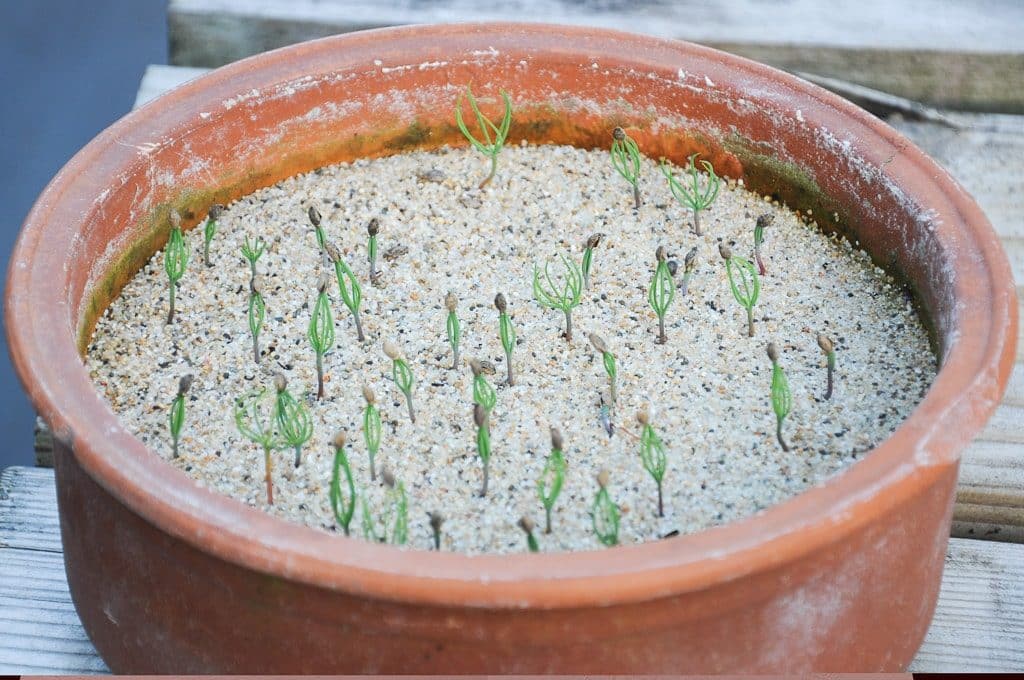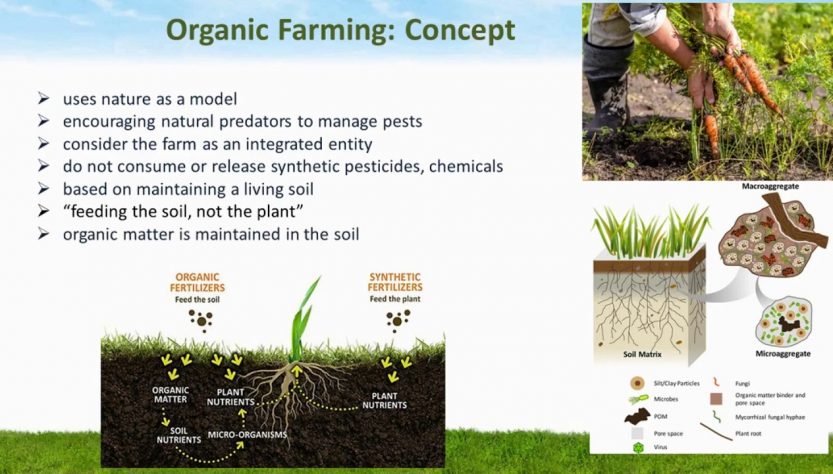Organic farming is a sustainable approach that embraces The essence of nature. It involves cultivating crops using natural methods, without The use of synthetic chemicals, pesticides, or genetically modified organisms. Organic farmers prioritize soil health, biodiversity, & animal welfare, practicing crop rotation, composting, & natural pest control. By conserving resources, minimizing pollution, & focusing on natural cycles, organic farming promotes long-term sustainability & ecological balance. It offers consumers healthier & more nutritious produce, free from harmful residues. Embracing organic farming is crucial for preserving The environment, enhancing food security, & promoting a healthier future for both people & The planet.
Understanding the Essence of Organic Farming: Embracing Nature’s Sustainable Approach. Explore The true essence of organic farming in this enlightening read! Discover The sustainable approach embraced by nature itself. Learn about this eco-friendly method that promotes healthier produce & supports a harmonious coexistence with our environment. Let’s delve into The beauty of organic farming & its benefits for us all!
Understanding The Essence of Organic Farming: Embracing Nature’s Sustainable Approach
Organic farming is a sustainable agricultural practice that focuses on cultivating crops & rearing livestock without The use of synthetic chemicals, genetically modified organisms (GMOs), or harmful pesticides. It relies on natural methods, such as crop rotation, composting, & biological pest control, To maintain soil fertility & maximize crop productivity. Organic farming not only protects The environment but also ensures The production of healthy, high-quality food for consumers.
For those interested in learning more about organic farming & its benefits, The Environmental Protection Agency (EPA) provides valuable information on its website. The EPA outlines The principles & regulations of organic farming, making it an excellent resource for individuals seeking a deeper understanding of this sustainable approach.
The Core Principles of Organic Farming
Organic farming is guided by several core principles that emphasize sustainability, biodiversity, & ecological balance. These principles include:

- Promoting soil health & fertility
- Minimizing The use of synthetic inputs
- Preserving biodiversity
- Supporting animal welfare
- Using renewable resources & efficient energy management
Adhering To these principles ensures that organic farming practices align with nature’s wisdom, focusing on long-term sustainability & The preservation of our planet’s resources.
The Benefits of Organic Farming
The adoption of organic farming methods offers numerous benefits, both for The environment & human health. Some of The key advantages include:
- Environmental preservation
- Improved soil fertility & structure
- Enhanced water quality
- Reduced soil erosion
- Promotion of bio-diversity
- Protection of wildlife habitats
- Elimination of synthetic pesticides & fertilizers from The food chain
Embracing organic farming practices not only ensures a healthier planet but also contributes To The production of nutrient-rich, flavorful food.
Challenges & Solutions in Organic Farming
While organic farming offers numerous benefits, it also poses unique challenges. Farmers practicing organic methods face difficulties such as pest management, weed control, & higher production costs. However, several effective solutions have been developed To address these challenges:
- Integrated pest management techniques
- Crop rotation & intercropping
- Mechanical weed control
- Utilization of natural fertilizers & compost
- Partnerships & collaborations within The organic farming community
A collaborative approach & continuous research play a vital role in overcoming these challenges, ensuring The success & growth of organic farming practices.
Organic Farming: A Global Perspective
Organic farming is a rapidly growing sector worldwide, driven by consumer demand for safer & healthier food options. According To The National Institute of Statistics & Economic Studies (INSEE), The global organic food market has experienced significant growth in recent years.
In addition To The environmental benefits, organic farming provides economic opportunities for small-scale farmers & rural communities. It fosters sustainable agriculture, promotes fair trade practices, & allows for The development of local, resilient food systems.
Embracing Nature’s Sustainable Approach
Understanding The essence of organic farming is essential in today’s world. By embracing nature’s sustainable approach, we can contribute To The preservation of our planet, protect our health, & ensure a prosperous future for generations To come.
Personally, I have witnessed The positive impact of organic farming on both The environment & The well-being of individuals. The shift towards organic practices not only reduces chemical pollution but also improves The taste & nutritional quality of The food we consume. It is a rewarding experience To support local organic farmers & be part of a movement that prioritizes sustainability & The well-being of all living creatures.
What is Organic Farming?
Organic farming is an agricultural practice that emphasizes The use of natural methods & techniques To grow crops & raise livestock. It is a holistic approach To farming that takes into consideration The interdependence of plants, animals, humans, & The environment. Organic farmers aim To cultivate healthy & nutrient-rich soil, minimize The use of synthetic chemicals, & promote biodiversity. This sustainable approach To agriculture focuses on preserving The health of ecosystems, improving soil fertility, & producing food that is free from harmful residues.
Benefits of Organic Farming
Organic farming offers a multitude of benefits, both for The environment & human health. By avoiding The use of synthetic fertilizers & pesticides, organic farmers help reduce water & air pollution. Organic practices also contribute To The preservation of soil quality & biodiversity, ensuring a healthier & more balanced ecosystem.

Additionally, organic farming promotes animal welfare by prohibiting The use of growth hormones & antibiotics in livestock production. From a consumer’s perspective, organic food is believed To be more nutritious & free from harmful chemicals, making it a popular choice for those seeking a healthier lifestyle.
The Principles of Organic Farming
Organic farming is guided by several fundamental principles that set it apart from conventional agriculture. These principles include:
1. Soil Health: Organic farmers prioritize The well-being of The soil by adopting practices that enhance its fertility & structure. They rely on natural methods like composting, crop rotation, & cover cropping To improve soil health & prevent erosion.
2. Biodiversity Conservation: Organic farming promotes biodiversity by creating a habitat for various organisms. Farmers employ techniques such as intercropping, polyculture, & The use of natural pest control methods To maintain a balance between pests, beneficial insects, & crop plants.
3. Avoidance of Synthetic Chemicals: One of The core principles of organic farming is The avoidance of synthetic chemicals, including fertilizers, pesticides, & genetically modified organisms (GMOs). Instead, organic farmers utilize natural alternatives like biopesticides & compost To nurture their crops & control pests.
The Certification Process
To ensure The credibility of organic products, many countries have established certification processes for organic farming. These processes involve rigorous inspections, adherence To strict standards, & compliance with specific labeling requirements. In The United States, The United States Department of Agriculture (USDA) has set The Organic Foods Production Act (OFPA) as The legal framework for organic farming. The USDA organic label guarantees that The product meets The organic standards defined by The National Organic Program (NOP).
The Role of Organic Farming in Sustainable Agriculture
Organic farming plays a vital role in The development of sustainable agriculture. By relying on natural resources & minimizing The use of synthetic inputs, organic farmers contribute To The reduction of greenhouse gas emissions & The conservation of water resources. Moreover, organic farming promotes The protection of biodiversity & The preservation of soil quality, crucial elements for long-term sustainability. By embracing organic farming practices, farmers can cultivate healthy, resilient ecosystems while producing food in harmony with nature.
Experiencing The Essence of Organic Farming
In my personal experience, embracing organic farming has been a transformative journey. The switch from conventional farming methods To organic practices has allowed me To reconnect with nature & gain a deeper understanding of The interconnectedness of all living beings. By prioritizing soil health & biodiversity, I have witnessed The resilience & vitality of my crops, as well as The thriving ecosystem that now surrounds my farm. Moreover, The satisfaction of knowing that I am producing food that is healthier for both consumers & The environment brings me a sense of fulfillment that cannot be understated.
Comparison of Organic Farming & Conventional Farming
| Aspect | Organic Farming | Conventional Farming |
|---|---|---|
| Use of Synthetic Chemicals | Minimizes or avoids The use of synthetic chemicals | Relies heavily on synthetic fertilizers & pesticides |
| Soil Health | Prioritizes soil health & fertility through natural methods | May deplete soil nutrients & structure over time |
| Biodiversity | Promotes biodiversity & supports a diverse range of species | May contribute To The loss of biodiversity due To monoculture practices |
| Environmental Impact | Reduces water & air pollution, conserves natural resources | May contribute To water & air pollution, soil degradation |
| Health Impact | Produces food free from synthetic residues, potentially more nutritious | May contain residues of synthetic chemicals, potential health risks |
Conclusion
Embracing organic farming & understanding its essence is essential for a sustainable future. By prioritizing soil health, biodiversity conservation, & The avoidance of synthetic chemicals, organic farmers play a crucial role in promoting a healthier environment & ensuring The well-being of both ecosystems & humans. Transitioning To organic farming methods is not only beneficial for The planet but also provides a fulfilling & rewarding experience for farmers. By aligning our practices with nature, we can create a more sustainable & resilient agricultural system for generations To come.

What is organic farming?
Organic farming is a sustainable approach To agriculture that emphasizes The use of natural methods & materials. It involves avoiding synthetic fertilizers, pesticides, & genetically modified organisms (GMOs), & instead focuses on enhancing soil health, promoting biodiversity, & conserving water resources. Organic farming strives To work in harmony with nature, creating a holistic & environmentally-friendly farming system.
Why should I embrace organic farming?
There are several compelling reasons To embrace organic farming. First & foremost, organic farming promotes The health & well-being of both consumers & farmers. It helps provide safe & nutritious food by eliminating The use of harmful chemicals & GMOs. Additionally, organic farming practices help protect The environment by reducing pollution, conserving water, & promoting biodiversity. Organic farming also supports rural communities & promotes sustainable & ethical farming methods.
How does organic farming improve soil health?
Organic farming focuses on building & maintaining healthy soil through various practices. It emphasizes The use of organic matter like compost & manure, which enhance soil fertility & structure. This promotes beneficial soil organisms, improves nutrient cycling, & increases water holding capacity. By avoiding synthetic fertilizers & pesticides, organic farming ensures that soil ecosystems thrive, leading To sustainable & long-term soil health.
What are some common organic farming techniques?
There are numerous organic farming techniques that farmers employ. These include crop rotation, where different crops are planted in a sequence To prevent pests & diseases buildup. Another technique is companion planting, which involves planting different crops together To enhance growth, repel pests, & attract beneficial insects. Additionally, organic farmers use natural pest control methods like introducing predators or using organic pesticides derived from plants.
How can organic farming contribute To biodiversity?
Organic farming practices help preserve & enhance biodiversity in several ways. By avoiding The use of chemical pesticides & fertilizers, organic farmers create habitats that support a wide range of beneficial insects, birds, & other wildlife. They also prioritize The preservation of native plant species & utilize traditional crop varieties, preventing genetic erosion. Organic farming systems often incorporate elements such as hedgerows & cover crops, which further support biodiversity by providing food & shelter for wildlife.
Does organic farming guarantee higher yields?
While organic farming may not always result in higher yields compared To conventional farming methods, it can still provide sustainable & profitable outcomes. Organic farming focuses on long-term soil health & fertility, which can lead To improved crop resilience & resistance To pests & diseases. While yields may vary depending on specific conditions & practices, organic farming aims To achieve a balance between productivity & sustainability, ensuring The long-term viability of agricultural systems.
Conclusion
In conclusion, organic farming represents a sustainable approach To agriculture, embracing nature’s wisdom & avoiding The harmful effects of conventional farming methods. By prioritizing soil health, biodiversity, & self-sufficiency, organic farmers are able To produce nutritious & safe food while preserving The environment for future generations.
One of The key principles of organic farming is The use of natural fertilizers & pesticides, which not only ensures The health & safety of consumers but also prevents pollution of soil, water, & air. The reliance on organic matter & beneficial insects for pest control promotes biodiversity & supports ecosystem balance, creating a harmonious environment where various species coexist.
Understanding the Essence of Organic Farming
Organic farming techniques encourage natural processes & emphasize The importance of soil fertility. Through practices like crop rotation, composting, & The use of cover crops, organic farmers replenish nutrients in The soil & maintain its structure, making it more resilient To erosion & drought. This, in turn, leads To healthier plants with higher nutritional content, benefiting both humans & The wildlife that feeds on them.
By embracing organic farming, we not only support a healthier lifestyle for ourselves but also contribute To The overall well-being of The planet. The reduced use of synthetic chemicals & The avoidance of genetically modified organisms reduce The impact on ecosystems & safeguard The long-term sustainability of our food production systems.
In conclusion, understanding & embracing The essence of organic farming is crucial for a sustainable future. It is a method that respects & works in harmony with nature, promoting biodiversity, soil health, & The well-being of all living beings. By choosing organic products & supporting organic farmers, we can make a positive impact on our health, The environment, & The future of agriculture.
